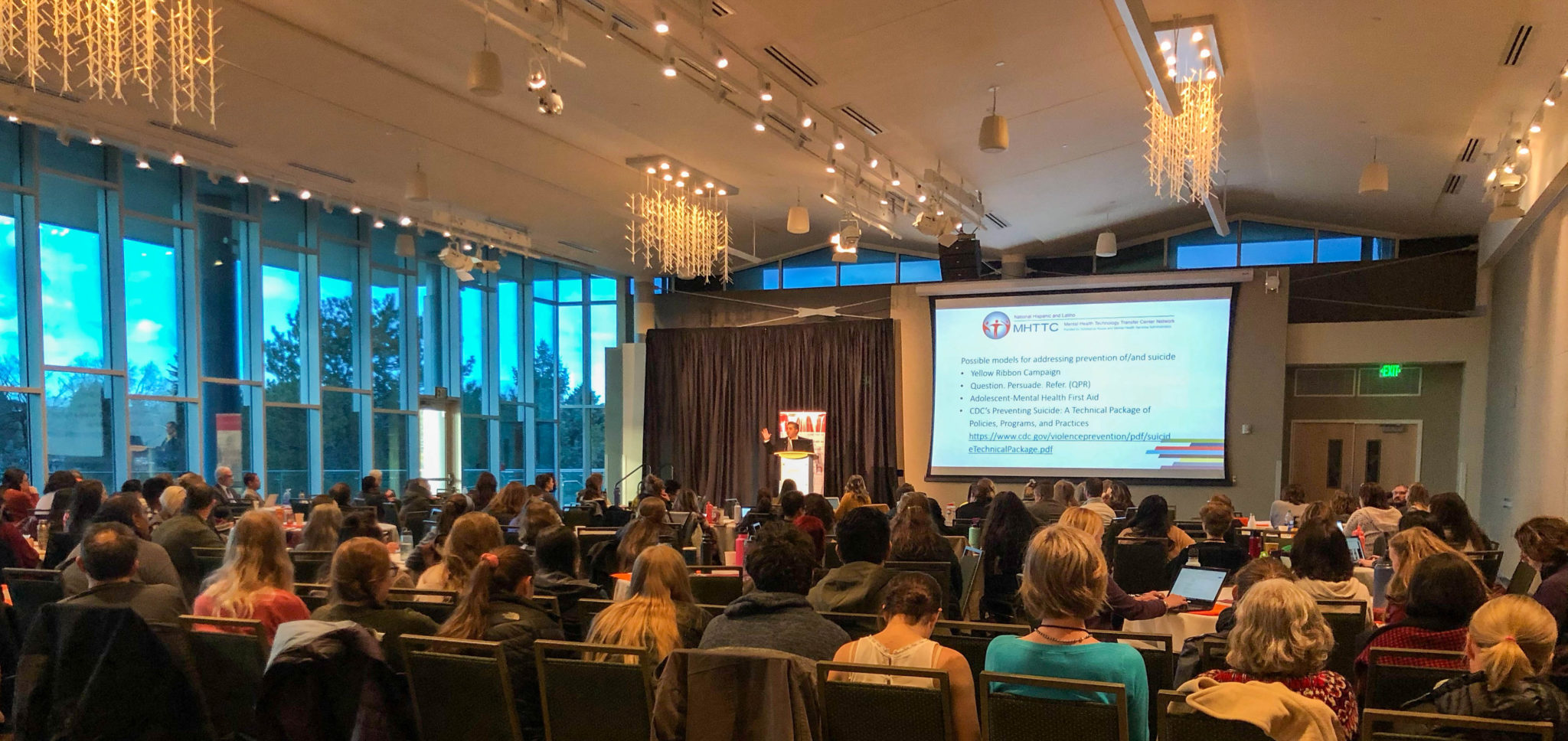
On January 23, faculty and students, as well as practitioners, leaders, and other members of the Colorado regional community who care about the health and mental health of Latinx populations, gathered on the Colorado State University campus for a conference focused on the great differences in healthcare for Hispanic and Latino/a/x individuals living in the U.S. today.
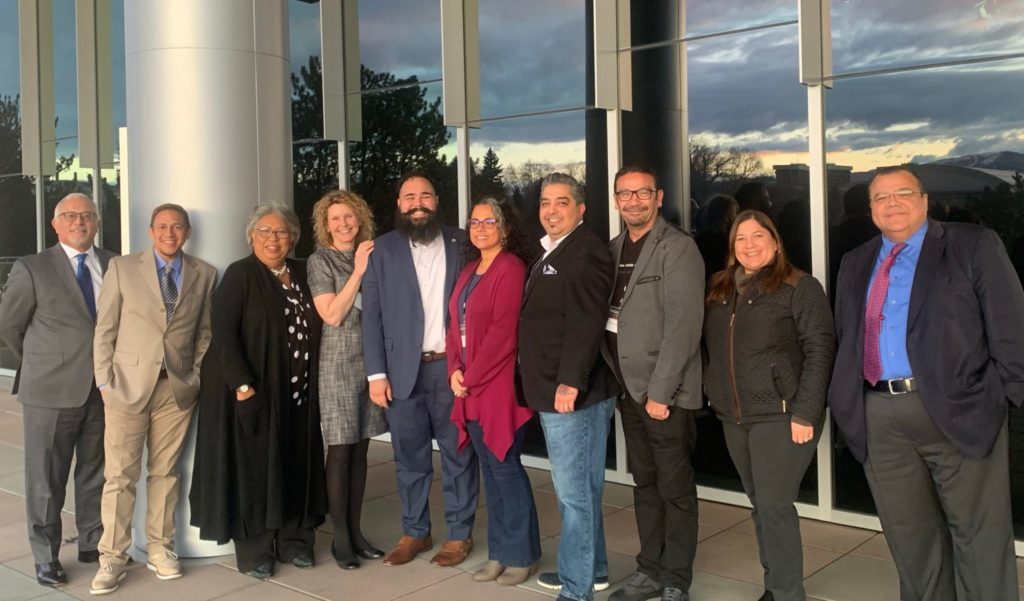
The conference, “Addressing Latinx Health Disparities in the U.S.,” was organized in joint partnership between CSU’s School of Social Work and the National Hispanic and Latino chapter of the Mental Health Technology Transfer Center (MHTTC). The event drew nearly 200 in-person attendees and 500 online webcast viewers.
Funded by the Substance Abuse and Mental Health Services Administration (SAMHSA) of the U.S. Department of Health and Human Services, the National Hispanic and Latino MHTTC is one of 10 regional centers dedicated to disseminating and implementing evidence-based practices for mental disorders into the field.
Healthcare issues for Latinx populations and their practitioners
During the conference, campus and community partners examined the intersections of immigration, trauma, substance use, and mental health. Presentations included:
- “Trauma Informed Care for Latinx Populations” by Dr. Luis R. Torres of the University of Houston;
- “Prevention of Substance Use and Mental Health Disorders in Latinx Communities” by Dr. Haner Hernandez of the Universidad Central del Caribe, School of Medicine;
- Adverse Childhood Experiences (ACES): Suicide Prevention Approaches with Latinx Children and Youth” by Dr. J. Rocky Romero of the Universidad Central del Caribe, School of Medicine;
- and “Self-care and Mindfulness as Important Strategies for Professionals serving Latinx Populations” by counseling psychologist Dr. Fabiola Giraldo.
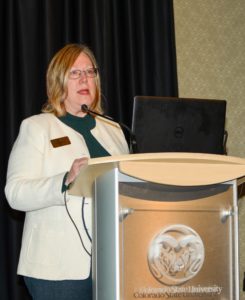
“The work that you are doing today could not be more timely or more important to us as a campus, as a community, as a state, and as a nation,” said Lise Youngblade, dean of CSU’s College of Health and Human Sciences.
“We’ve prioritized, as a college, the areas of mental and behavioral health, and our commitment to diversity, equity, and inclusion,” Youngblade said. “Providing students with great training in mental and behavioral health, in the context of culturally appropriate care, is incredibly important.”
“Not only are we thinking about students here at CSU, but what skills and knowledge they’ll take to their communities, and how that impacts what our future holds,” said Youngblade.
In its 2021 strategic plan, CSU’s College of Health and Human Sciences laid out a commitment to help address issues of inequity and social justice with the intention of improving lives for all people, including the underserved and underrepresented.
Social work perspective on systems
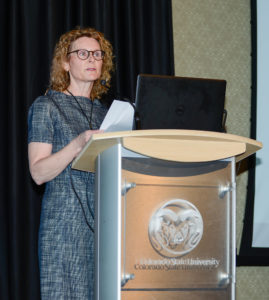
In her welcome, School of Social Work Director Audrey Shillington discussed the history of discriminatory immigration policies in the U.S. for the past hundred years, noting how policies change relative to shifting economic demands.
“In 2018, the ‘zero-tolerance’ policy memorandum was created for attempted entry or reentry in the U.S. along the Southwest border,” Shillington said. “This zero-tolerance policy criminalized the act of asylum-seeking.”
“Policies that have driven immigration control efforts have resulted in trauma and its long-term effects on individuals, families, and communities,” said Shillington. “We know that many of the immigrant families crossing our borders are seeking refuge or asylum from atrocities and unlivable circumstances in their home countries.”
“The practice of separating children from their families compounds their trauma, causes irreparable damage, and is a violation of human rights,” Shillington said. “In addition to the harm caused to children and their families, these practices do and will continue to have an impact and consequences rippling through our society.”
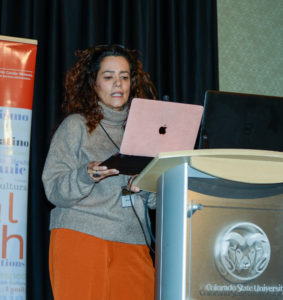
Johanna Ulloa Girón, an adjunct instructor in the School of Social Work and community services manager for the Poudre River Public Library District, and December 2019 recipient of the Human Relations Award from the City of Fort Collins, called for participants to recognize the systems in our society which can exacerbate and even create mental illness.
“To address health disparities in Latinx communities without addressing the daily impact of white supremacy, oppression, discrimination, and racism is, at best, naïve and incomplete and, at worst, very dangerous, specifically when providing therapeutic treatments,” said Ulloa Girón.
“We must treat mental health illnesses specifically with consideration of the systems that in the first place co-create those illnesses. The systems exacerbate and in some cases actually create mental illness. Also it is a system that makes it difficult to seek help,” Ulloa Girón said.
Identifying impacts of immigration detention harms
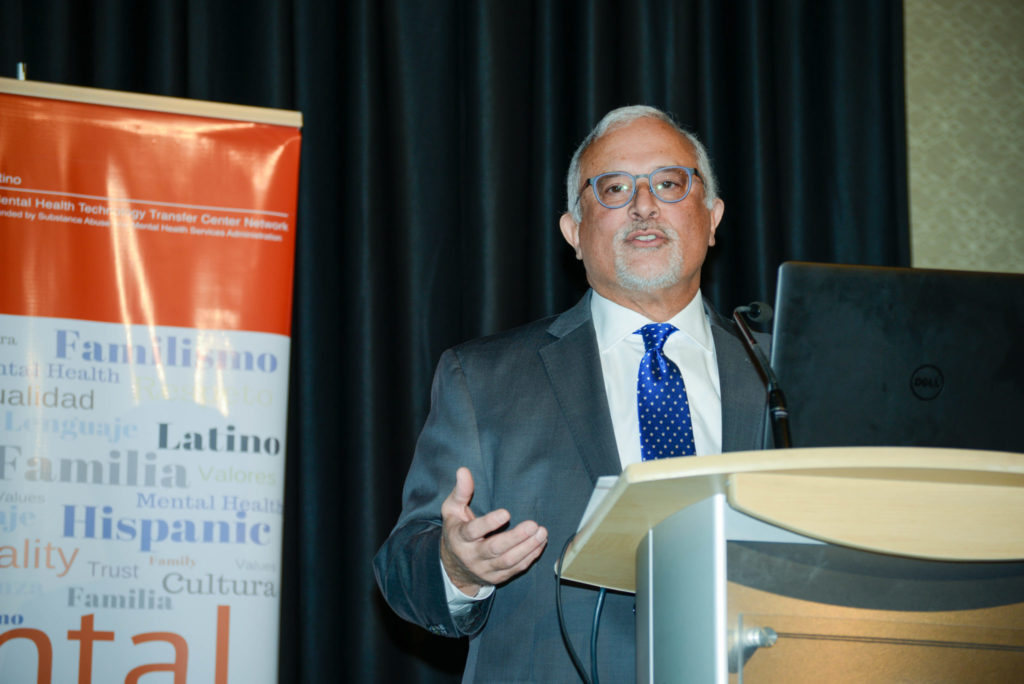
The conference keynote was presented by Luis H. Zayas, dean of the Steven Hicks School of Social Work and professor of psychiatry in the Dell Medical School at The University of Texas – Austin. Zayas is an active practitioner through his evaluations of immigrant children and families facing deportation, and of refugee and asylum-seeking mothers and children held in immigration detention centers.
Zayas focused on immigration detention and the long-term harm to children’s well-being. “These folks in detention and after detention need urgent medical care,” he said. “We need to do the psychosocial assessment and the therapeutic interactions, and the individual work with parents—the men or the women that will need the services to help them through, because of intergenerational trauma. This is a subpopulation that we will need to deal with.”
“Educational services are also critical—having a child’s mother understand why children respond in a certain way, so she can understand the developmental and clinical impact,” Zayas said. “Doing some parent-child interaction therapy, and the occasional assessment that they’re going to need, so we can fit them into a school in our community and then bring them into our community so they have a sense of belonging, that they are welcomed and supported.”
Zayas brought pragmatic and touching insight, based on his work evaluating immigrant children and families, to the full-day program. “Even if after a few years they are returned to their home countries or if their asylum claims are turned down,” he said, “I think it’s our duty as a country and as humans to take care of those who have less and have suffered more.”
The School of Social Work is part of the College of Health and Human Sciences. Recordings of selected presentations from this event are available at the following links: